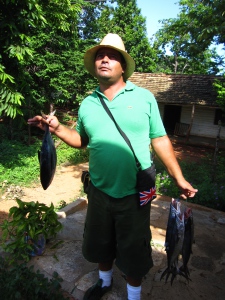The war waged over the sea around Havana is not a result of a conflict between nations. It’s a dispute among local fishermen and divers concerning the fishing zones created and granted to them by mutual agreement in a meeting of fishermen held in 2012.

“The fishermen who participated in the meeting divided the sea among themselves. A decree was adopted, incorporating one inviolable rule: it is forbidden to enter a zone allocated to somebody else. The rule has been observed for a long time, but many fishermen now take risks and violate it due to the growing crisis.”
Joaquinito, one of Jaimanitas’s prominent fishermen, confirms this. He says that problems began in 2014, when some fishermen with the right to exploit local waters procured LED flashlights and began to work on two shifts, day and night.
“Before that, it was impossible to see the exact location of the diver in the darkness. Now we had to start keeping the night watch. It’s not very healthy, but at least it often gives us some economic security.”
Around a hundred people are dedicated to diving and fishing in Jaimanitas. Almost all of them are fathers of families who set out to the sea to make a living. Cuco is one of them. He is a member of one of the founding families of the town: the Picúas. He says that it’s hard to imagine how many things can be found in the sea.
“My zone starts at the mouth of the river and goes up to the front of my house. The sea abounds with mojarra, red mullet and yellowtail snapper. In June and September there’s also sea bream. There aren’t many sea worms, but there is a strong current that passes through my zone, carrying everything that gets in its way in the gulf, and curves back at the estuary. We used to give all the fresh fish to the Police, but we stopped doing that when Raulito handed the Police a bundle of dollars he had found and was arrested. He was interrogated and intimidated into telling the Police whether he had found any more bundles like that. How absurd!”
Nico is a fisherman and a diver. He says he has found many pieces of jewellery lost by swimmers in his zone. The most valuable was a one-carat brilliant that helped him overcome his financial problems.
“My zone goes from the La Conchita beach to the wall of the Los Marinos social club. It is very rich in sea worms and sea snails. As it is immediately adjacent to the shoal, there is also plenty of pompano fish and amberjack. It is the most coveted area. That’s why I hardly have any time to sleep, because I have to watch out for intruders.”
Another diver I have interviewed was old Chichi, one of the few living members of the “Fishing Wall of Fame” of Jaimanitas.
“People used to show respect and solidarity, but that has been forgotten. They have no moral values anymore. Before, fishing and diving was family business. Today it’s different, anyone who comes here from anywhere violates the ethics and fishes wherever he wants. It has already caused a number of arguments. Division of the sea into zones was the only solution we could find. No one can imagine how dangerous the night can be, when the sea is as dark as a wolf’s mouth. A diver can be mistaken for fish and shot at with a spear gun, or end up gutted by a boat’s propeller.
Joaquinito, who is regarded as a spokesman for the fisherman’s guild, says that he has studied the problem in depth. He believes that it has intensified with the crisis in Cuba, but that’s not all.
“The real trigger point of this war was the current price of the octopus. You get 3 CUC for a pound, which is 75 national pesos! Can you imagine how much money you make if you catch ten pounds a day and then you bring another ten pounds at night? 60 CUC, 1200 pesos… A week at that pace leaves many a fisherman sleepless; they take big risks, fishing wherever they may. One thing we are sure of: we must put an end to this before the battle over the sea has a first victim. A few years ago, Yoyo, a diver fishing for chelonians in a zone that he wasn’t allowed to enter, was found drowned at the bottom of the sea, tied to a stone. Just imagine that… There are no fingerprints in the water. The Police concluded that Yoyo suffered a blackout, but none of us fishermen is willing to believe that Yoyo died this way.”

Leave a comment